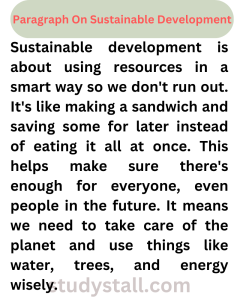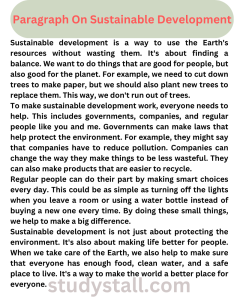Sustainable development is a concept that aims to fulfill the needs of the present generation while ensuring the ability of future generations to meet their own needs. It is a holistic approach that integrates social, economic, and environmental dimensions to achieve long-term prosperity.
Paragraph On Sustainable Development 100 words
Sustainable development is about using resources in a smart way so we don’t run out. It’s like making a sandwich and saving some for later instead of eating it all at once. This helps make sure there’s enough for everyone, even people in the future. It means we need to take care of the planet and use things like water, trees, and energy wisely.
Paragraph On Sustainable Development 200 words
Sustainable development is a way of living and working that makes sure we don’t waste or run out of important things like water, trees, and energy. It’s like having a big cake and cutting it into pieces so that everyone can have some, even people who come to the party late. By doing this, we make sure there’s enough for everyone, both now and in the future.
To practice sustainable development, people do things like recycling, using less water, and not wasting food. Some companies are making products that are better for the environment. For example, they might make a car that uses less gas or a bag that can be used many times. By making better choices, we help protect the Earth for future generations.
Paragraph On Sustainable Development 300 words
Sustainable development is a way to use the Earth’s resources without wasting them. It’s about finding a balance. We want to do things that are good for people, but also good for the planet. For example, we need to cut down trees to make paper, but we should also plant new trees to replace them. This way, we don’t run out of trees.
To make sustainable development work, everyone needs to help. This includes governments, companies, and regular people like you and me. Governments can make laws that help protect the environment. For example, they might say that companies have to reduce pollution. Companies can change the way they make things to be less wasteful. They can also make products that are easier to recycle.
Regular people can do their part by making smart choices every day. This could be as simple as turning off the lights when you leave a room or using a water bottle instead of buying a new one every time. By doing these small things, we help to make a big difference.
Sustainable development is not just about protecting the environment. It’s also about making life better for people. When we take care of the Earth, we also help to make sure that everyone has enough food, clean water, and a safe place to live. It’s a way to make the world a better place for everyone.
Paragraph on Sustainable Development 500 words
Importance of Sustainable Development
Sustainable development is crucial for the well-being of our planet and its inhabitants. It recognizes the interdependence between economic growth, social progress, and environmental protection. Here are some key reasons why sustainable development is important:
- Environmental Conservation: Sustainable development focuses on preserving natural resources and reducing the negative impact of human activities on the environment. It aims to promote responsible consumption and production, protect biodiversity, and mitigate climate change.
- Social Equity: Sustainable development seeks to address social inequalities and promote social inclusion. It aims to provide equal opportunities for all, irrespective of their gender, age, race, or socio-economic background. This ensures a more just and fair society.
- Economic Stability: Sustainable development aims to foster economic growth that is inclusive, resilient, and sustainable. It encourages the development of industries that minimize resource consumption, promote innovation, and create long-term employment opportunities.
- Long-Term Planning: By incorporating sustainability principles, sustainable development encourages long-term planning and decision-making. It takes into account the potential consequences of actions and strives to ensure that present actions do not compromise the ability of future generations to meet their needs.
Pillars of Sustainable Development
Sustainable development is guided by three interconnected pillars: economic, social, and environmental. These pillars work together to achieve holistic and balanced development. Let’s explore each pillar in detail:
1. Economic Sustainability
Economic sustainability focuses on creating an economy that meets the needs of the present generation without compromising the ability of future generations to do the same. It involves:
- Sustainable Business Practices: Encouraging businesses to adopt sustainable practices, such as reducing waste, increasing energy efficiency, and promoting ethical sourcing.
- Inclusive Economic Growth: Ensuring that economic growth benefits all members of society, including marginalized groups, by providing equal opportunities and reducing income inequality.
- Responsible Investment: Promoting investment in sustainable projects and industries, such as renewable energy, clean technology, and eco-friendly infrastructure.
2. Social Sustainability
Social sustainability aims to create a society that is inclusive, equitable, and promotes the well-being of all its members. Key aspects of social sustainability include:
- Access to Basic Needs: Ensuring access to clean water, healthcare, education, and adequate housing for all individuals.
- Gender Equality: Promoting gender equality and empowering women to participate fully in all aspects of society.
- Community Engagement: Encouraging active participation and involvement of communities in decision-making processes that affect their lives.
3. Environmental Sustainability
Environmental sustainability focuses on preserving and restoring the natural environment and its resources. It involves:
- Conservation of Natural Resources: Promoting responsible resource management, including water, forests, minerals, and biodiversity.
- Renewable Energy: Transitioning from fossil fuels to renewable energy sources, such as solar, wind, and hydroelectric power, to reduce greenhouse gas emissions and combat climate change.
- Waste Management: Implementing efficient waste management strategies, including recycling and waste reduction measures, to minimize environmental pollution.
Achieving Sustainable Development Goals
To achieve sustainable development, various stakeholders, including governments, businesses, civil society organizations, and individuals, need to work together. The United Nations has outlined a set of Sustainable Development Goals (SDGs) as a roadmap for achieving sustainable development by 2030. These goals address various global challenges, including poverty, hunger, climate change, inequality, and environmental degradation.
Some of the SDGs include:
- No Poverty
- Zero Hunger
- Gender Equality
- Affordable and Clean Energy
- Climate Action
- Sustainable Cities and Communities
Each goal has specific targets to be achieved, and progress is regularly monitored to ensure meaningful change is taking place.
In conclusion, sustainable development is an essential approach that aims to balance economic, social, and environmental considerations. By integrating these dimensions, we can create a better and more sustainable future for ourselves and generations to come. It requires collective efforts and commitment from all stakeholders to achieve the Sustainable Development Goals and create a more equitable and resilient world.
FAQ
- What is sustainable development?
- Sustainable development is a concept that aims to fulfill the needs of the present generation while ensuring the ability of future generations to meet their own needs. It integrates social, economic, and environmental dimensions for long-term prosperity.
- Why is sustainable development important?
- Sustainable development is important because it recognizes the interdependence between economic growth, social progress, and environmental protection. It focuses on environmental conservation, social equity, economic stability, and long-term planning.
- What are the pillars of sustainable development?
- The pillars of sustainable development are economic, social, and environmental. These pillars work together to achieve holistic and balanced development.
- What does economic sustainability involve?
- Economic sustainability involves creating an economy that meets the needs of the present generation without compromising the ability of future generations to do the same. It includes encouraging sustainable business practices and promoting inclusive economic growth.
